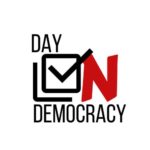Ashley Utz was a freshman at the University of Mary Washington when she registered to vote. To cast her ballot, she needed to find time during her busy class schedule and figure out which polling place was hers.

“My inexperience with the voting process made it all the more challenging,” said Utz, now a senior, who has spent the past two years working with fellow students and Marina Castro-Meirelles ’18 to launch UMW’s inaugural Day on Democracy, making voting easier for Mary Washington students. Cancelling lecture classes on Election Day is just one aspect of this nonpartisan celebration – the first student-initiated event of its kind at a public, four-year institution in the United States – filled with civic education and political participation opportunities.
At the same time, in response to a polarized election season, the University is reminding students to honor others’ opinions and uphold UMW’s community values through ASPIRE Speak, a new initiative that promotes civility and respectful discourse.
“UMW attracts civic-minded students, and research shows that close relationships with faculty, like the ones formed at Mary Washington, often have a positive impact on voting rates,” Castro-Meirelles said. Nearly 87 percent of UMW students were registered to vote in 2016, exceeding the national average, according to a report released by the National Study of Learning, Voting and Engagement.
But some students never made it to the polls, Castro-Meirelles observed, citing reasons like unfamiliarity with the candidates, uncertainty about which of three voting precincts assigned to Mary Washington students was theirs and inability to find time outside of class to cast their ballot. “If students spend the majority of their time on Election Day in class, when do they have time to vote?”
In 2018, the University Faculty Council approved Castro-Meirelles’ proposal to replace classes with a campus-wide celebration of democracy during future November general elections. A student-led committee, chaired by Utz, Associate Professor of Psychological Science David Stahlman and Sarah Dewees, associate director of UMW’s Center for Community Engagement (CCE), began meeting this February to plan civic programming throughout the fall semester, culminating with the first-ever Day on Democracy on Nov. 3.
Then came COVID-19, along with a switch to digital events. The days leading up to the election will be filled with bite-sized civics lessons on Zoom, Democracy Bingo, the Freedom Now Voting Competition and virtual keynote speeches. On Election Day, there will be online workshops, socially distanced volunteering and a conversation about Black Lives Matter and police brutality led by student activists with different political positions. A Zoom couch party, complete with music and prizes, closes out the celebration.
“We’re responding to this moment as we originally intended,” said Castro-Meirelles, who hopes to replicate the event at other colleges and universities nationwide and is tracking the growing movement. “By doing all we can to create a more informed and engaged electorate in our inaugural election cycle.”
In addition, CCE will offer Election Day care packages, direct students to their respective polling places and has joined the James Farmer Multicultural Center to provide a moderated “Wall of Hope” message board, where students can express – respectfully – their post-election thoughts. Political Science Professor Stephen Farnsworth, who directs UMW’s Center for Leadership and Media Studies, will also lead a post-election debrief session.
During this divisive election season, President Troy Paino reminded the UMW community in a recent email to continue to engage in a way consistent with the University’s ASPIRE values.



“Eagles speak up, but not over,” said Vice President for Equity and Access Sabrina Johnson in a video promoting ASPIRE Speak.
“As a liberal arts and sciences university, we are very mindful that our mission is to prepare you, our students, for professional and public leadership in a global environment of rapid change,” she said. “That includes a working and learning environment that acknowledges differences of opinion and that treats others with respect, whether we agree with them or not.”


